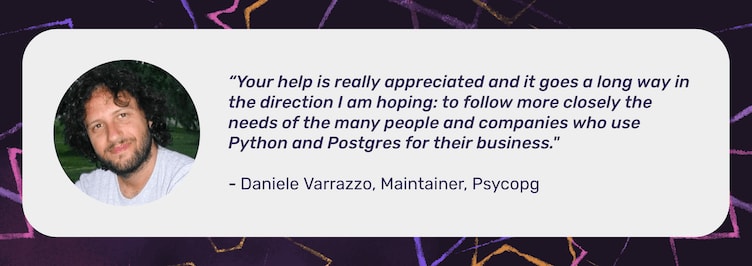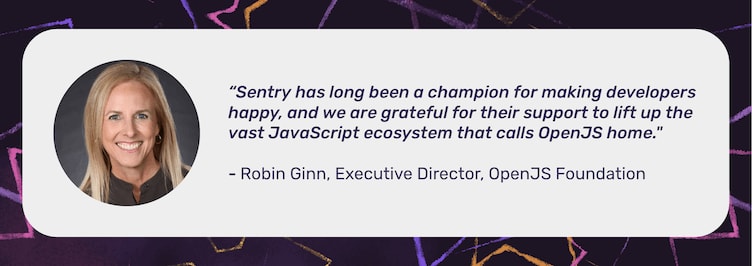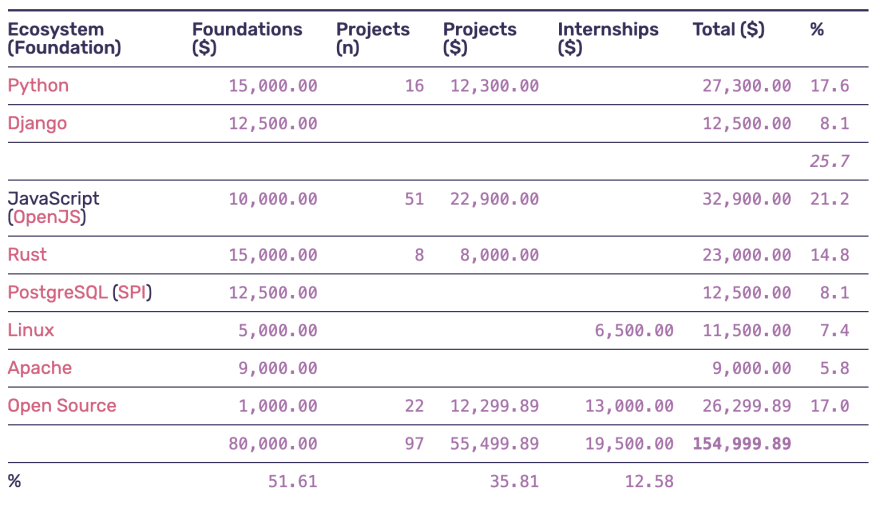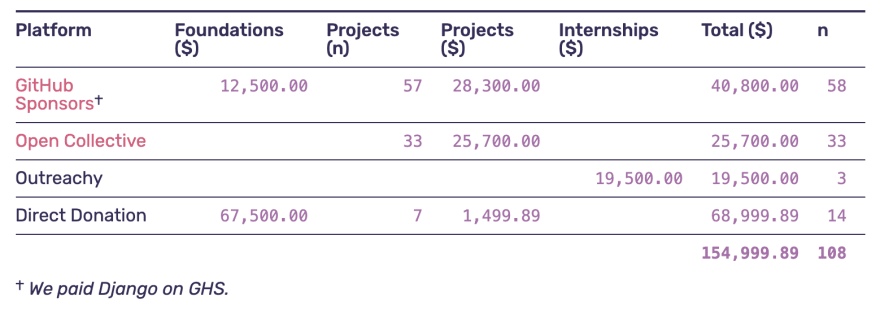By: Chad Whitacre
Sentry is an open source company. We started out in 2008 as a small open source side project, and we grew within the community for years before commercializing in 2012. We’ve worked hard to keep our full product as open source as possible, while scaling as a business. Considering our commitment to open source, we are grateful to be able to give back to the community (and what better time than during Hacktoberfest, amirite?).
(P.S. The good folks at Sustain brought us onto their podcast for a deep dive on this funding initiative. If you like what you’re reading here, mosey on over and check out the episode.)
Background
Sentry has a long history of sharing our business success with the open source community. We have supported the Python and Django Software Foundations since 2016 with donations totalling about $75,000. Over the years, we’ve also supported smaller projects like Vue.js, Django Rest Framework, and Psycopg. In 2019, we awarded a $10,000 grant to Techqueria, a nonprofit serving the largest community of Latinx in tech, for open source work on their website. And in 2020, the Sentry team was pleasantly surprised to receive a $10,000 grant from Indeed, which we matched and regifted to five projects in the Python and Rust ecosystems.
Outside of direct financial contributions, Sentry invests in the open source community in many ways: we donate SaaS credits to open source projects, sponsor conferences and meetups, and contribute patches to upstream projects. Additionally, Sentry has a general employee philanthropic donation-matching program in which open source foundations are eligible.
Sentry’s FOSS Fund 155
Indeed’s generous $10,000 donation to us was part of an industry initiative they launched called FOSS Fund Adopters; Microsoft and Salesforce are also on board. When we announced our matching regift, we also committed to increasing our own giving to open source, which we have now done with our own iteration that we’re calling FOSS Fund 155. We distributed $154,999.89 to 108 recipients, grouped under three line items:
- Foundation memberships (52%),
- Long-tail projects through GitHub Sponsors and Open Collective (36%), and
- Internships for new contributors through Outreachy (13%).
Why that suspiciously specific amount? Well, napkin math suggests that tech companies receive approximately $2,000 of value from volunteer labor in the open source community, per engineer on staff. Sentry employs approximately 75 engineers, and 75 × $2,000 = $150,000, so that became our target budget. We bumped it up a bit to meet foundation membership fee thresholds. As to the 11¢ offset, we have currency conversion to thank.
One of our goals for FOSS Fund 155 is to contribute meaningfully. We believe that contributing $2,000 per engineer is a meaningful amount that fairly compensates the value we receive from open source volunteers.
Another of our goals is to lead by example within the industry. We want to raise the bar for how companies in the tech industry think about their financial relationships with the open source community. Transparency into companies’ open source contributions is valuable to the community and the industry, and to individuals making career decisions. Reporting this information per individual engineering contributor makes it easier to compare across companies.
Allocating Our Budget
All tech companies stand on the shoulders of community-supported open source giants, and Sentry is no exception. With this fund we prioritized support for our dependencies in order to strengthen our supply chain. But, more than that—Sentry itself was a volunteer-run project for many years. Yes, we took a commercial route, but we respect the many projects that have chosen a different path. Maintainers should be able to determine their own future, and financially supporting our community-managed dependencies makes that a bit more feasible for them.
By auditing our product architecture, we generated a list of seven major community-led open source projects that are foundational to our success: Python, Django, Rust, JavaScript, PostgreSQL, Apache, and Linux. These projects are all backed by formal non-profit foundations; we added an eighth foundation, the Open Source Initiative, to represent the open source community as a whole. We decided to allocate half of our budget (52%) to these eight foundations.
Another way we think about our goal to contribute meaningfully is in intentionally welcoming new contributors into the open source community. We ran a diversity-focused open source grant program in-house in 2019, and it was a great experience. However, we think we can make even more of an impact by partnering with an existing organization. Outreachy has a great track record of providing internships in open source to individuals from underrepresented backgrounds, so we allocated $19,500 (13%) to sponsor three interns to work on projects in our dependencies. Debian and LLVM were able to use the funds directly. Git asked us to redirect their portion to the Outreachy general fund.
Another of our goals for this funding program is to reinforce open source as part of Sentry’s company culture, so we involved our employees in allocating the remainder (36%) of our budget. We did some dependency analysis using the GitHub API to identify the community-led, fundable projects within the ecosystems we inhabit. We asked our employees to influence our contributions to these projects by voting on them, and also to nominate other projects that are meaningful to them. We ended up with a list of 97 projects to support, in addition to the eight foundations and the three internships.
Throughout this exercise, we filtered out open source projects that have strong corporate leadership (Sentry itself would be an example), as well as our employees’ side projects (since we already compensate them financially). This serves our goal to contribute meaningfully by directing our money where it can have the most impact. We also tried to balance breadth and depth, focusing larger amounts on some projects, while giving at least a little bit to every maintainer we identified.
In the end, we distributed $154,999.89 to 108 recipients: eight foundations, 97 individual projects, and three internship partners. Visit our GitHub Sponsors (GHS) and Open Collective (OC) profiles for the details; below is a summary (sorry it’s cut off on mobile).
Where the $154,999.89 Went
How the Money Got There
Looking Ahead
Our final goal for Sentry’s open source funding program is to sustain in a sustainable way. We feel good about what we were able to put together this year for Sentry’s FOSS Fund 155, and we will continue to iterate on our open source financial support as we continue to scale. Thank you to all of the maintainers out there—especially the volunteers. We appreciate you, and we look forward to financially supporting your work for many years.























